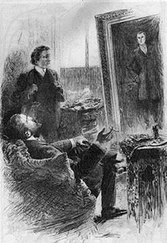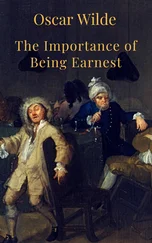Ernest was still in the East and no one seemed to know where he was, or what he was doing. The surveyors had passed through Megory and extended the survey to the county line, five miles west of the town. The right-of-way man was following and had just arrived from Hedrick and Kirk, where he had made the same offer he was now making Megory. "If" he said, addressing the "town dads" and he seemed to want it clearly understood, "the C. & R.W. builds to Megory, we want you to buy the right-of-way three miles east and four miles west of the town."
Then Governor Reulback, known as the "Squatter Governor," acting as spokesman for the citizens, arose from his seat on the rude platform, and before accepting the proposition—needless to say it was accepted—called on different individuals for short talks. Among others he called on Ernest Nicholson; but Frank, the Junior member of the firm, arose and answered that Ernest was away engaged in purchasing the C. & R.W. railroad and that he, answering for Ernest, had nothing to say. A hush fell on the crowd, but Governor Reulbach, who possessed a well defined sense of humor, responded with a joke, saying, "Mr. Nicholson's being away purchasing the C. & R.W. railroad reminds me of the Irishman who played poker all night, and the next morning, yawning and stretching himself, said, 'Oi lost nine hundred dollars last night and seven and one-half of it was cash.'"
The backbone of the town was beginning to weaken, while there were many who continued to insist that there was hope. Others contracted rheumatism from vigils at the surveyor's camp, in vain hope of gaining some information as to the proposed direction of the right-of-way. The purchasing of the right-of-way and the unloading of carload after carload of contracting material at Oristown did little to encourage the belief that there was a ghost of a show for Calias.
In a few days corral tents were decorating the right-of-way at intervals of two miles, all the way from Oristown to Megory. In the early morning, as the sound of distant thunder, could be heard the dull thud of clods and dirt dropping into the wagon from the elevator of the excavator; also the familiar "jup" and the thud of the "skinner's" lines as they struck the mules, in Calias one and one-half miles away.
A very much discouraged and weary crowd met Ernest when he returned, but even in defeat this young man's personality was pleasing. He was frank in telling the people that he had done all that he could. He had gone to Omaha where his father in-law joined him, thence to Des Moines, where his father maintained his office as president of an insurance company, that made loans on Little Crow land. Together with two capitalists, friends of his father, they had gone into Chicago and held a conference with Marvin Hewitt, President of the C. & R.W. who had showed them the blue prints, and, as he put it, any reasonable man could see it would be utterly impossible to strike Calias in the route they desired to go. The railroad wanted to strike the Government town sites, but the president told them that if at any time he could do them a favor to call on him, and he would gladly do so.
In a few days a man named John Nodgen came to Calias. Towns which had failed to get a road looked upon him in the way a sick man would an undertaker. He was a red-haired Irishman with teeth wide apart and wildish blue eyes, who had the reputation of moving more towns than any other one man. He brought horses and wagons, block and tackle, and massive steel trucks. He swore like a stranded sailor, and declared they would hold up any two buildings in Calias.
The saloon was the first building deserted. The stock had not been removed when the house movers arrived, and in some way they got the door open and helped themselves to the "booze," and when full enough to be good and noisy, began jacking up the building that had been the pride of the hopeful Caliasites. In a few weeks a large part of what had been Calias was in Megory and a small part in Kirk.
It had stopped raining for a while, and several large buildings were still on the move to Megory when the rain set in again. This was the latter part of July and how it did rain, every day and night. One store building one hundred feet long had been cut in two so as to facilitate moving, and the rains caught it half way on the road to Megory. After many days of sticking and floundering around in the mud, at a cost of over fourteen hundred dollars for the moving alone, not counting the goods spoiled, it arrived at its new home. The building in the beginning had cost only twenty-three hundred dollars, out of which thirty cents per hundred had been paid for local freighting from Oristown. The merchant paid one thousand dollars for his lot in Megory, and received ten dollars for the one he left in Calias.
This was the reason why Rattlesnake Jack's father and I could not get together when he came out and showed me Rattlesnake Jack's papers. It was bad and I readily agreed with him. I also agreed to sign a quit claim deed, thereby clearing the place, so she could complete her proof. Everything went along all right, until it came to signing up. Then I suggested that as I had broken eighty acres of prairie, the railroad was in course of construction, and land had materially increased in valuation—having sold as high as five thousand dollars a quarter section—I should have a guarantee that he would sell the place back to me when the matter had been cleared up.
"I will see that you get the place back"—he pretended to reassure me—"when she proves up again."
"Then we will draw up an agreement to that effect and make it one thousand dollars over what I paid", I suggested.
"I will do nothing of the kind," he roared, brandishing his arms as though he wanted to fight, "and if you will not sign a quit claim without such an agreement, I will have Jack blow the whole thing, that is what I will do, do you hear?" He fairly yelled, leaning forward and pointing his finger at me in a threatening manner.
"Then we will call it off for today," I replied with decision, and we did. I confess however, I was rather frightened. In the beginning I had not worried, as he held a first mortgage of one thousand, five hundred dollars, I had felt safe and thought that they had to make good to me in order to protect their own interests. But now as I thought the matter over it began to look different. If he should have her relinquish, then where would I be, and the one thousand, five hundred dollars I had paid them?
I was very much disturbed and called on Ernest Nicholson and informed him how the matter stood. He listened carefully and when I was through he said:
"They gave you a warranty deed, did they not?"
"Yes, I replied, it is over at the bank of Calias."
"Then let it stay there. Tell him, or the old man rather, to have the girl complete sufficient residence, then secure you for all the place is worth at the time; then, and not before, sign a quit claim, and if they want to sell you the place, well and good; if not, you will have enough to buy another." And I followed his advice.
It was fourteen months, however, before the Scotch-Irish blood in him would submit to it. But there was nothing he could do, for the girl had given me a deed to something she did not have title to herself, and had accepted one thousand, five hundred dollars in cash from me in return. As the matter stood, I was an innocent party.
About this time I became imbued with a feeling that I would like "most awfully well" to have a little help-mate to love and cheer me. How often I longed for company to break the awful and monotonous lonesomeness that occasionally enveloped me. At that time, as now, I thought a darling little colored girl, to share all my trouble and grief, would be interesting indeed. Often my thoughts had reverted to the little town in Illinois, and I had pictured Jessie caring for the little sod house and cheering me when I came from the fields. For a time, such blissful thoughts sufficed the longing in my heart, but were soon banished when I recalled her seeming preference for the three dollar a week menial, another attack of the blues would follow, and my day dreams became as mist before the sun.
Читать дальше












